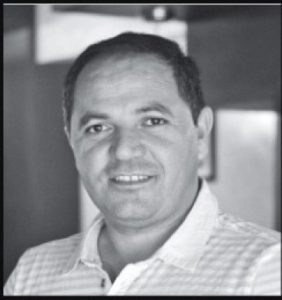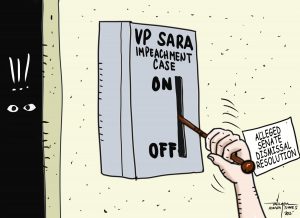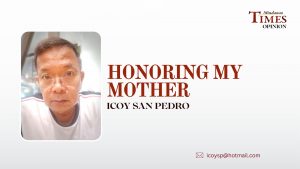
Part 2
PEOPLE can have racist behavior for many reasons because they do not know each other, they lack understanding of “the other,” and they often put labels on others and are quick to judge them. A framework of assigning traits and, thus, worth arises.
“He goes to that school, so he must be rich.” “He dresses like this, so he must be an extremist.” The best way to get rid of a stereotype is to get to know people from different racial backgrounds and to build bridges to find out how much we have in common.
Of course, we are products of our own environment, and many of our attitudes are shaped when we are young. When our family members, community, or friends express racist opinions or comment about others, it is common that we will take on those views ourselves. Unless we do something about them, they can stay with us forever.
Peace building seeks to consolidate an existing peace and thus is different from peace enforcement. Peace building activities include education and an active civic society that creates social capital, trust, and cooperation over ethnic, religious, and other divisions.
The attitude and approach of inclusiveness and open debate are conducive to peace and harmony between sections of society. There is a long history of violence, racism, exploitation, and race supremacy stretching back centuries until today in every society and in every race, but that timeline needs to be interrupted. To do so, it begins with me. It begins with each of us.
We are called to recognize the things that make for peace and to live in the reality of the weak shaming the strong. We need to take anti-Asian violence and racism seriously. We need to take Chinese oppression against the Uyghur Turks seriously; we need to take seriously Myanmar’s persecution of the Rohingya Muslims.
The world needs to do more to ensure justice and equality for all; every country needs to protect its citizens. So long as there are acts of violence targeting Asian-Americans, or people of any race, everyone has to speak out loudly against the hate and prejudice because these attributes are intolerable in any civilized society.
Leadership is important because trust is an imperative aspect of the whole process. Leaders are elected to safeguard that trust given to them to carry out their responsibility.
Being a leader is not just a matter of filling up a specific important position or job, but in carrying out the trust inculcated in that role. Leaders are also accountable to God. But many leaders lack this pivotal element in leadership.
Due to the essence of power the society bestows upon them, leaders should have the ability to unite and lead a disintegrated society of different sects and religious beliefs. But this is seldom the case because often leaders perceive leadership only as the position of authority for them to further their personal interests.
To be just is not easy because personal inclinations and preferences might jeopardize the application of real elements of justice. The problem of governance that arises in most nations, including the United States today, are the repercussions of poor management of public resources and the failure in policy implementation by leaders who lack commitment, integrity, and relevant knowledge. It is important for leaders to be knowledgeable and capable of high competencies and correct attitudes for their followers to replicate, such as in matters of divisions and animosities.
Racism is a virus. As an infective agent too small to be seen but one that multiplies within the living cells of a host, we always blame other for our problems. When we feel upset or frustrated, we often seek someone else to blame.
As a community, we tend to do the same thing. When people talk differently from us or look unlike us, they become easy targets. This response springs from ignorance, and an ignorant person is a dangerous person. Those who commit hate crimes, for example against Asians, fit this kind of profile and are mostly ignorant people.
America is a great country; it is a melting pot; Americans with their different races, ethnicities, and religions travel around the globe. Even though the homeland is a land of honey and milk and prosperity, many people miss the opportunity of enjoying the richness of those resources and of that melting pot.
To see that melting pot, a viewer needs only to visit a university campus. There, in general, Asians spend time with Asians, Middle Easterners with Middle Easterners, Whites with Whites, and Black with Blacks. It is normal to want to spend time with people that have the same interests, background, culture, faith, and language.
Aggregating according to “likeness of kind” gives us a sense of belonging that is really important. But the disadvantage is that this behavior can also set up differences between other groups, and over time this might lead us to think that our group is better than others.
Just as the Coronavirus is an infectious disease that we aggressively combat to prevent its spreading, as a society we need to fight against racism. In the case of Covid-19, we wash our hands, disinfect surfaces, and maintain distance. In our war against racism, we can take precautions: we can wash our hearts and minds.
As a reminder, every time we wash our hands, we should wash the racism encroaching in our hearts. We need to break the cycle of racism being passed on to the next generation by maintaining distance from those who have learned or engendered racism; otherwise, the government alone will not stop racism but rather the public.
A lifelong process of building relationships based on trust, consistency, and accountability with marginalized individuals, race groups of people. Because God created us after His own kind, the Man-kind, we reproduce after our own kind. We are different from the rest of creation with our ability to gain knowledge, analyze, understand, and choose to do the right thing.
We do not have to conform to the world around us, but we can choose to embrace other races, religions, and ethnicities as we focus on our commonality—image bearers of God.
Dr. Aland Mizell is President of the MCI and a regular contributor to the Mindanao Times. You may email the author at:aland_mizell2@hotmail.com



